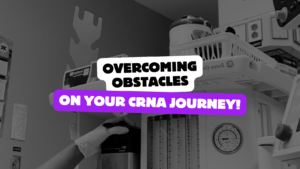You’ve made it to the interview stage – congratulations! But did you know this is where the majority of qualified CRNA school applicants see their dreams derailed?
With acceptance rates under 3% at some of the top programs, even candidates with perfect GPAs and extensive ICU experience can falter during the critical interview phase. After investing years in preparation, the last thing you want is for what could be a 30-minute interview to undermine all your hard work.
In this article, you’ll discover the proven interview strategies used by successful CRNA school candidates to transform high-pressure interviews into acceptance letters.
Master the STAR Method for Clinical Excellence
The STAR method provides a structured framework for showcasing your clinical judgment during CRNA school interviews. This approach ensures your answers are concise, relevant, and highlight your capabilities effectively.
The method breaks down as follows:
- Situation: Describe the specific circumstance or challenge
- Task: Explain your responsibility in that situation
- Action: Detail the specific steps you took
- Result: Share the outcome of your actions
Consider this STAR response to a question about managing a difficult airway:
Situation: “During a rapid response on the night shift, a post-op CABG patient showed signs of respiratory distress.”
Task: “I needed to assist with emergency airway management while coordinating with the response team.”
Action: “I quickly positioned the patient, gathered intubation equipment, and communicated clearly with the physician about the patient’s condition and changing vital signs.”
Result: “The patient was successfully intubated, stabilized, and later thanked me for my calm presence during a frightening situation.”
Preparing 8-10 clinical scenarios using this framework is essential for interview success. These scenarios should showcase different aspects of your clinical expertise:
- Emergency response situations
- Complex patient management
- Team leadership examples
- Error recognition and correction
- Patient advocacy moments
Navigating the Red Flag Questions That Sink Most Applicants
Interview committees intentionally ask difficult questions to evaluate your candor and self-awareness. Successful candidates address potential weaknesses directly rather than avoiding them.
Common Red Flag Questions:
- GPA Concerns: “I notice your science GPA is lower than our average. Can you explain?”
- Acknowledge directly
- Explain circumstances briefly
- Focus on improvement actions
- Share current success metrics
- Experience Questions: “You only have exactly 12 months of ICU experience. Why apply now?”
- Highlight quality over quantity
- Share specific patient experiences
- Mention additional certifications
- Connect experiences to CRNA readiness
- Mistake Questions: “Tell me about a time you made a serious mistake.”
- Choose an appropriate example
- Show accountability (no blaming)
- Emphasize lessons learned
- Detail prevention strategies implemented
- Commitment Questions: “How do we know you won’t quit when it gets difficult?”
- Provide evidence of past resilience
- Share challenges you’ve overcome
- Detail your support systems
- Connect to your long-term vision
Virtual Interview Excellence in the Digital Age
Beyond content preparation, many programs now conduct virtual interviews, requiring additional technical preparation.
Technical Setup Tips:
- Position camera at eye level
- Ensure light sources face you (not behind you)
- Create a clean, professional background
- Test technology 24 hours before and 30 minutes before
- Have a backup device ready and charged
Professional Presentation:
- Wear full business attire (not just visible portions)
- Practice looking directly at camera for eye contact
- Monitor posture and hand movements
- Prepare water and notes strategically placed
- Eliminate all possible distractions
Environment Control:
- Notify household members about interview timing
- Silence all devices including computer notifications
- Close unnecessary computer programs
- Prepare backup internet options
- Have the program’s contact information readily available
A polished virtual setup shows programs you respect their time, take the process seriously, and are ready to step into the professional role you’ve been working toward.
Your CRNA Interview Success Roadmap
To maximize your chances of interview success, take these specific actions:
- Practice with purpose:
- Schedule three mock interviews with different people
- Record yourself to identify unconscious habits
- Practice with both technical and behavioral questions
- Request honest feedback from experienced healthcare professionals
- Build your STAR story bank:
- Prepare 10 clinical examples using the STAR format
- Include scenarios demonstrating clinical judgment
- Showcase leadership, team collaboration, and problem-solving
- Ensure examples are recent and relevant to anesthesia concepts
- Create a pre-interview checklist:
- Technology verification steps
- Professional appearance checks
- Environment preparation details
- Materials to have on hand (notes, water, program information)
- Research program-specific details:
- Review faculty research interests
- Understand clinical rotation sites
- Know program-specific features and strengths
- Prepare 3-5 thoughtful questions that demonstrate your knowledge
- Prepare your follow-up:
- Draft a thank-you email template
- Customize with specific interview details within 24 hours
- Reference specific discussions from your interview
- Reaffirm your interest in the program
Final Thoughts
The CRNA school interview is your opportunity to bring your application to life. With thorough preparation, you can transform a high-pressure interview into a showcase of your candidacy.
Don’t leave your interview success to chance. SFNA members have full access to our complete Interview Mastery Resources, including:
- “10 Trickiest CRNA School Interview Questions” guide
- Quarterly mock interview sessions
- STAR method templates
- Virtual interview setup guide
- Professional follow-up templates
Your CRNA journey represents years of dedication—make sure your interview preparation matches the effort you’ve put into every other aspect of your application.
Ready to take the next step?
👉 Become an SFNA member today at half price (use coupon code SFNA50) and unlock the tools, mentorship, and support you need to succeed.






